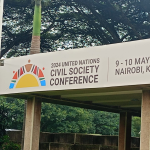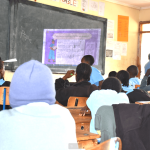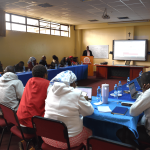
The Social Justice for Children and Young People project by LCMC is a values-based initiative designed to empower children and youth from marginalized communities through creative expression, rights education, and civic engagement. By focusing on themes such as equality, non-violence, human dignity, and inclusivity, the project helps children understand their rights and develop the confidence to advocate for themselves and their communities.
At the heart of the program is a participatory, arts-based approach that includes drama, poetry, debate, journalism, visual arts, and storytelling. Through these mediums, children are not just passive recipients of information they become active creators, change agents, and storytellers of their own experiences.
What We’ve Done So Far in 2025
This year, LCMC expanded the reach of the Social Justice project to Tuum in Samburu County, working directly with schools and local communities to address urgent social issues affecting young people.
1. Youth Empowerment through Creative Expression
In January 2025, LCMC facilitated a two-day Social Justice training program at Tuum Girls Secondary School and Tuum Primary School, engaging more than 120 students. The training focused on critical issues including:
- Female Genital Mutilation (FGM)
- Early and forced marriage
- Child abuse
- Drug and substance abuse
Through workshops and performances, students were encouraged to express their perspectives and propose solutions using drama, spoken word, poetry, debate, and visual storytelling.
2. Cultivating Core Values at Primary Level
At Tuum Primary School, 118 children participated in a vibrant workshop series that explored values such as self-awareness, trust, freedom, and responsibility. Children used drawings, songs, and short plays to communicate their understanding of these concepts, offering heartfelt reflections on how these values affect their daily lives and future aspirations.
3. Community Engagement & Parental Buy-In
LCMC’s work in Samburu has gone beyond the classroom to include community engagement sessions with parents, teachers, and local leaders. These sessions often held after school programs or religious gatherings have helped build local ownership and support for child-centered advocacy. The involvement of community members is key to creating safe and nurturing environments for young people.
4. Building a Culture of Expression and Resilience
LCMC’s approach goes beyond one-off workshops. The children involved in the Social Justice project are now part of an ongoing journey that includes:
- Creative arts mentorship
- Audio-visual content production
- Storytelling and docu-drama projects
These platforms allow children to continue developing their voices, leadership skills, and capacity for resilience in the face of systemic challenges.
Impact at a Glance
- Students at Tuum Secondary delivered bold dramatic performances highlighting the dangers of teenage pregnancy, abuse, and gender-based violence.
- At Tuum Primary, children produced original poems, songs, and artwork reflecting their understanding of children’s rights and personal agency.
- One student, Irene Mpatiya, reflected:
“Through LCMC, I can now stand in front of people and speak to them.”
Looking Ahead
The Social Justice project continues to grow expanding into more rural communities, reaching more children, and deepening its impact through sustained mentorship and creative advocacy. By investing in the voices of the young, LCMC is helping to shape a more just, inclusive, and compassionate future for all.







